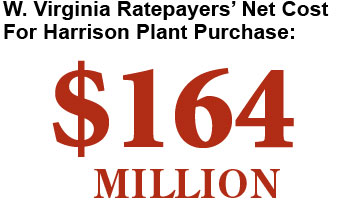IEEFA Report: FirstEnergy Strategy of Re-Regulating Plants in West Virginia a ‘Boon’ to Company and a ‘Burden’ to Ratepayers

CLEVELAND, Sept. 8, 2016 (IEEFA.org) — The Institute for Energy Economics and Financial Analysis today published a report examining how ratepayers will bear the risk of a proposal by Ohio-based FirstEnergy to re-regulate the Pleasants Power Station.
The report—“Re-Regulating Coal Plants in West Virginia: A Boon to FirstEnergy, a Burden to Ratepayers”—notes that FirstEnergy’s proposal follows a model established three years ago in the company’s re-regulation of the Harrison Power Station.
“The acquisition of 79% of the Harrison power plant by FirstEnergy’s Mon Power has yet to produce any financial benefit to Mon Power and Potomac Edison customers,” the memorandum concludes. “On the contrary, IEEFA estimates the deal has cost customers more than $160 million relative to what they would otherwise have paid for electricity while at the same time shielding FirstEnergy from suffering a comparable loss had the plant continued to be owned by Allegheny Energy Supply.”
Cathy Kunkel, a West Virginia-based energy analyst said it is “highly unlikely” that the Harrison deal will provide a benefit to customers for the remainder of the plant’s useful life.
“The poor financial performance of Harrison to date raises serious doubts about whether the Harrison acquisition provides a good ‘model’ for West Virginia to follow in evaluating FirstEnergy’s plan to have Mon Power purchase the Pleasants power plant,” Kunkel said.
Jacqueline Lake Roberts, director of the Consumer Advocate Division of the Public Service Commission of West Virginia, said the IEEFA evaluation of the impact of the Harrison plant was notable.
“The report does an excellent job of evaluating the costs to West Virginia ratepayers of the acquisition of the Harrison generating station by Mon Power/PE,” Roberts said. “As the Consumer Advocate Division expected, the costs are much higher than proposed, mostly due to the assumptions in the utilities’ forecasts of costs.”
“It is critical that whenever a West Virginia utility acquires a generating station as expensive as Harrison that it solicit bids from several sellers—not just from an affiliate company that is trying to shift risk from their shareholders to West Virginia ratepayers.”
In a commentary published today on IEEFA’s website, Kunkel said FirstEnergy “is following a strategy of re-regulation that stands to benefit shareholders at ratepayer expense.”
“The Pleasants transfer plan is part of a larger strategy by FirstEnergy to re-regulate unprofitable assets in deregulated markets as a way to ensure ratepayer subsidies,” Kunkel said. “The FirstEnergy/Pleasants proposal will likely cost ratepayers dearly, much as these other deals either have, or will, if they are allowed to proceed.”
Media contact: Karl Cates, [email protected], 917.439.8225
About IEEFA
The Cleveland-based Institute for Energy Economics and Financial Analysis (IEEFA) conducts research and analyses on financial and economic issues related to energy and the environment. The Institute’s mission is to accelerate the transition to a diverse, sustainable and profitable energy economy and to reduce dependence on coal and other non-renewable energy resources.













